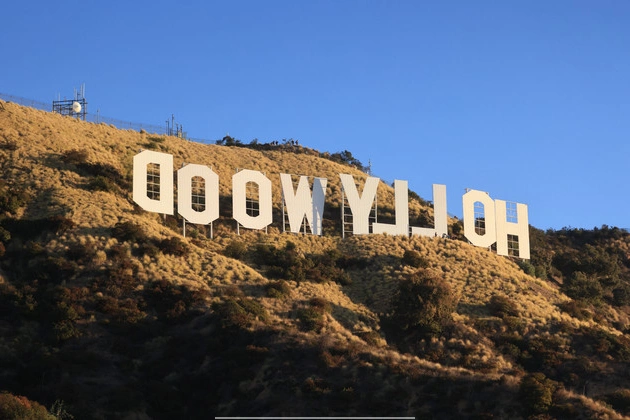
LOS ANGELES — President Donald Trump wants to show Hollywood the money.
Hollywood would like the president to show some specifics.
Trump’s Sunday evening vow to clamp punishing 100 percent tariffs on foreign film imports left movie studios, labor unions, and California elected officials trying to assess how the president’s latest trade gambit — crafted with input from his Hollywood envoy Jon Voight — would impact the state’s faltering entertainment industry.
Assessing the Impact
Rather than setting off another round of anti-Trump broadsides from an industry and a state brimming with Democrats, the move was met with bewilderment. (Voight’s publicist did not respond to a request for comment).
“If the President announces a proposal with more details,” Gov. Gavin Newsom said in a statement, “we will review it.”
Rep. Laura Friedman, a Democrat who represents Hollywood and has worked as a film producer, questioned how Trump’s plan would work — whether, for example, it would apply when a single location is filmed overseas — and said a nascent legislative push for a national film tax credit would be a simpler and more effective way to prevent America from “losing a signature industry.”
“Fundamentally, how does this tariff work?” Friedman said in an interview. “A film is not something you can tariff like it’s a crate. Do you tariff the entire production of the film?”
Those details were not forthcoming from the White House on Monday. An administration official granted anonymity to discuss internal deliberations said the Commerce Department “is figuring it out” and would likely release a study. Trump himself deflected a question about the nuts-and-bolts of the tariff idea.
The Decline of Hollywood
The issue of Hollywood’s decline is real and profound. Film production for years has been migrating away from its longtime epicenter in Los Angeles as other states and countries have lured away shoots with tax credits and lower costs.
A survey by FilmLA, an industry group that works with the city and county, found the number of productions made in the Los Angeles region plummeted by a quarter from 2018 to 2023 as the United Kingdom, New York and other locations added studio space.
The contraction prompted Newsom to propose more than doubling the state’s existing film tax credit. But California Democrats who have been working to shore up the industry were immediately wary of Trump’s announcement given his well-established animosity toward the state and his contentious relationship with Hollywood, where liberal thought is dominant.
Political Responses and Concerns
Assemblymember Rick Zbur pointedly noted in a statement that Trump’s tariffs to date — which California has sued to block — “are harming American consumers.” Sen. Adam Schiff argued in a statement that a federal film tax incentive would be preferable to tariffs that could have “unintended and potentially damaging impacts.”
“President Trump has a deep disdain for California and has not been shy about trying to hurt us in every possible way that he can,” said Assemblymember Isaac Bryan, a Los Angeles Democrat, arguing the president’s proposal was “not in our best interest.”
The issue quickly seeped into California’s governor race as multiple Democratic candidates cast aspersions. Former Los Angeles Mayor Antonio Villaraigosa said the “reckless” gambit would backfire. Former Health and Human Services Secretary Xavier Becerra said in an interview that “it’s hard to know what (Trump) is serious about.”
“Did he think that through?” Becerra asked rhetorically. “Did he think anything through?”
Industry Speculations
As with Trump’s on-again, off-again tariffs on foreign trading partners, his announcement left the entertainment world suspended in a state of anticipation. The logistics of Trump’s threat alone have left experts puzzled.
The head of the powerful SAG-AFTRA union, Duncan Crabtree-Ireland, said in a statement that the union was awaiting specifics. A representative for the California Film Commission referred to Newsom’s statement, and a representative for FilmLA declined to comment.
The Motion Picture Association, which represents the industry’s biggest studios, declined to comment on Trump’s pronouncement but noted that the trade group’s most recent economic impact report found the U.S. movie and TV industry ran a $15.3 billion trade surplus in 2023 and carried a positive trade balance in “every major market in the world.”
This isn’t entirely unprecedented territory. In 2001, a coalition of labor organizations petitioned the International Trade Commission to investigate possible tariffs on film and TV productions from Canada in response to Canadian subsidies ravaging the industry. The labor groups withdrew the request before the agency could make a determination, but a 2007 petition for USTR to probe whether the Canadian subsidies violated trade rules was swiftly rejected.
Now Trump is again firing a warning shot at foreign film industries. Laurence Farreng, a member of the European Parliament from French President Emmanuel Macron’s Renew party, predicted that “Americans will be the ones paying the bill.”
“I will be present at Cannes,” Farreng said, referring to the glitzy film festival that draws A-list actors, directors and producers to the south of France each summer, “and I believe that this subject will keep the producers very busy.”











